Environmental Groups, Law Center File “Friend of Court” Brief in Opposition to Challenge to Delaware River Basin Commission Fracking Ban

HARRISBURG, Pa. (April 15, 2021) – Earlier today, PennFuture, Clean Air Council, and the Widener University Commonwealth Law School’s Environmental Law and Sustainability Center filed a “friend of the court” amici curiae brief with the U.S. District Court for the Eastern District of Pennsylvania in the case of Yaw v. DRBC.
Specifically, amici oppose ongoing efforts by Pennsylvania State Senate Republicans, local municipalities and others to challenge the Delaware River Basin Commission’s February 25, 2021 ban on fracking within the watershed. The Plaintiffs in this case embed in their complaint a baseless claim that Article I, Section 27 of the Pennsylvania State Constitution, known as the Environmental Rights Amendment (ERA), requires fracking in the watershed.
The amici brief focuses on the ERA, which recognizes a public right to have the Commonwealth conserve and maintain public natural resources for the benefit of present and future generations. Amici show that the Plaintiffs’ are wrong for three main reasons:
● The ERA is not a grant of authority to the government but recognizes a constitutional environmental right granted to the public;
● The ERA does not authorize exploitation of public natural resources for public and private economic benefit; rather, the Commonwealth has a fiduciary duty to conserve and maintain these natural resources for the benefit of the public; and
● The ERA protects a public trust that is composed of actual, physical public natural resources, such as the water resources protected by the Commission’s ban on fracking.
John Dernbach, Professor and Director of the Environmental Law and Sustainability Center at Widener Commonwealth School of Law said, “Pennsylvania’s Environmental Rights Amendment is a unique and fundamental protection for our public natural resources. As trustee, the Commonwealth – including state and local governments – has the fiduciary duty to conserve and maintain these natural resources for present and future generations. The arguments presented by the Plaintiffs in this case would turn the Amendment upside down, making it a vehicle for exploiting natural resources for economic gain.”
“We must not let the spirit and purpose of our constitutionally protected environmental rights be corrupted,” said Jessica O’Neill, Senior Attorney for PennFuture. “We are compelled to set the record straight on Pennsylvania’s Environmental Rights Amendment to protect our rights, the rights of future generations, and case precedent which is clear that the Commonwealth must conserve and maintain our public natural resources. Nothing in the Environmental Rights Amendment authorizes fracking or any other exploitation of Pennsylvania’s natural resources for public or private economic benefit. The DRBC’s ban on fracking is necessary to protect the health of our communities and environment and we support it.”
“Fifty years ago, Pennsylvanians gifted today’s generation and all future generations with the guarantees of clean air, pure water, and protections for our natural bounty,” said Joseph Otis Minott, Esq., Executive Director and Chief Counsel of Clean Air Council. “There is no way to twist those words into a requirement that the state trash that bounty with polluting industry. The DRBC did a great service to the region by banning fracking and was well within its lawful authority in doing so.”

